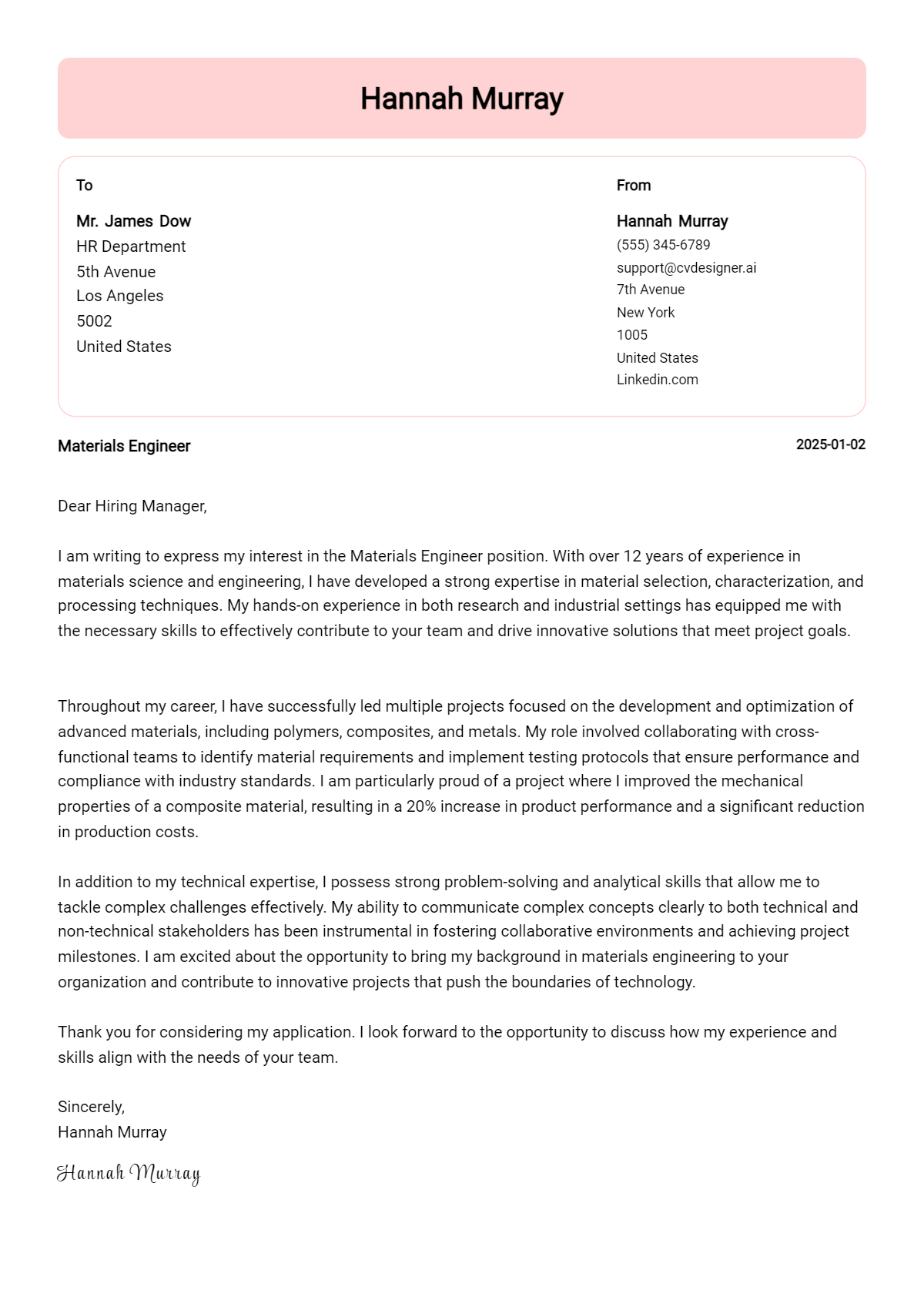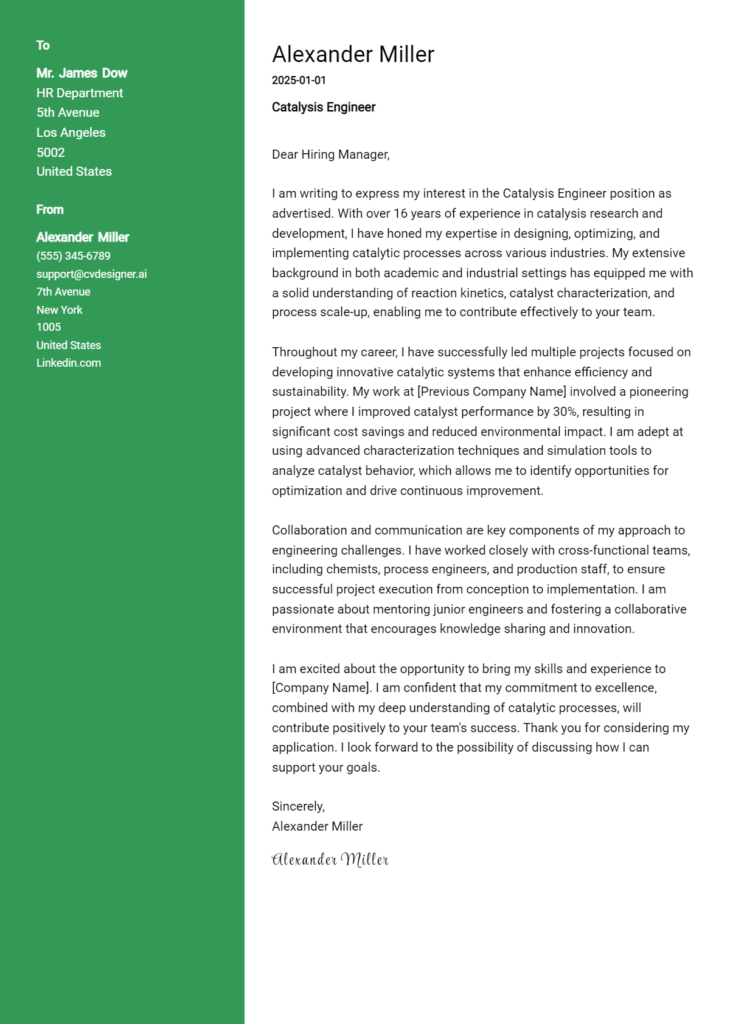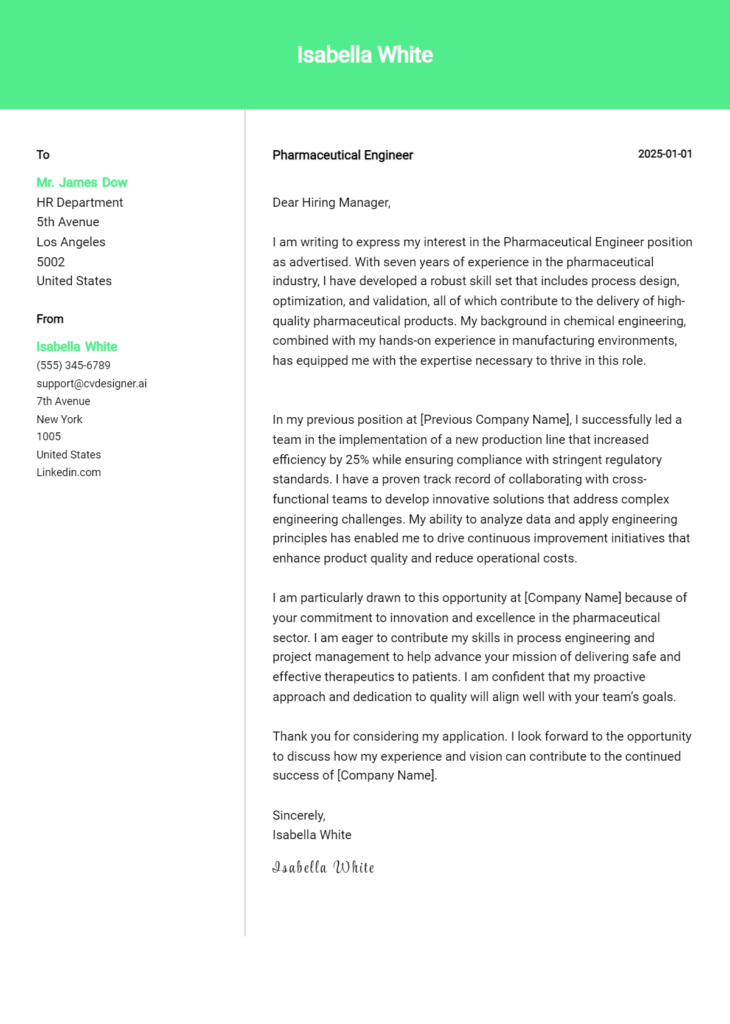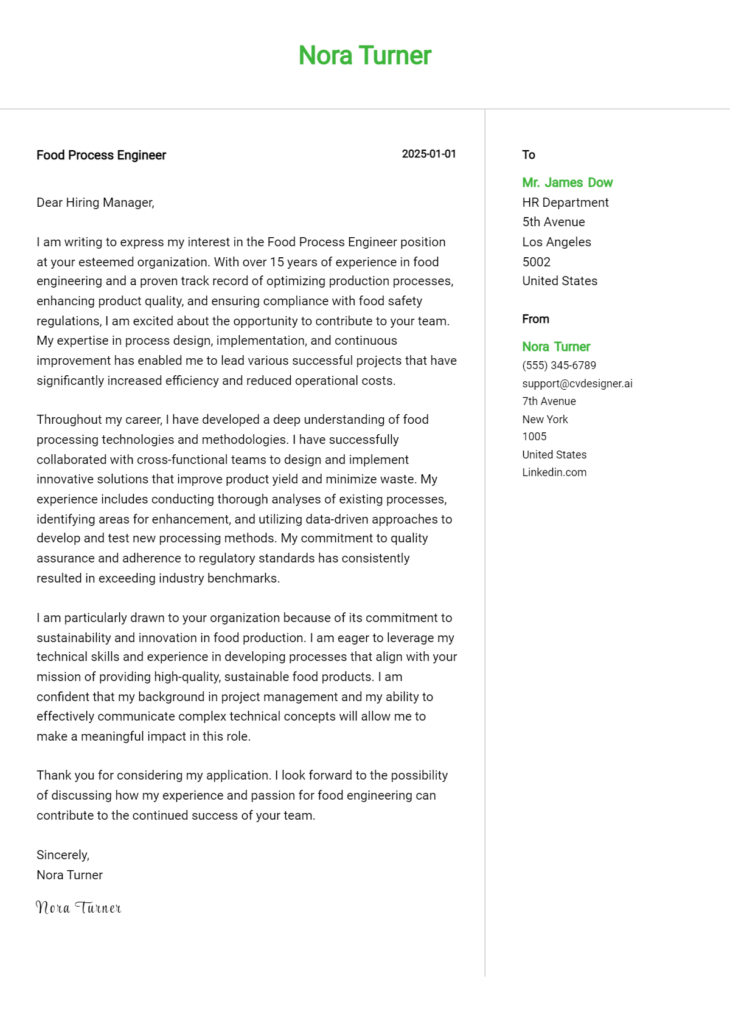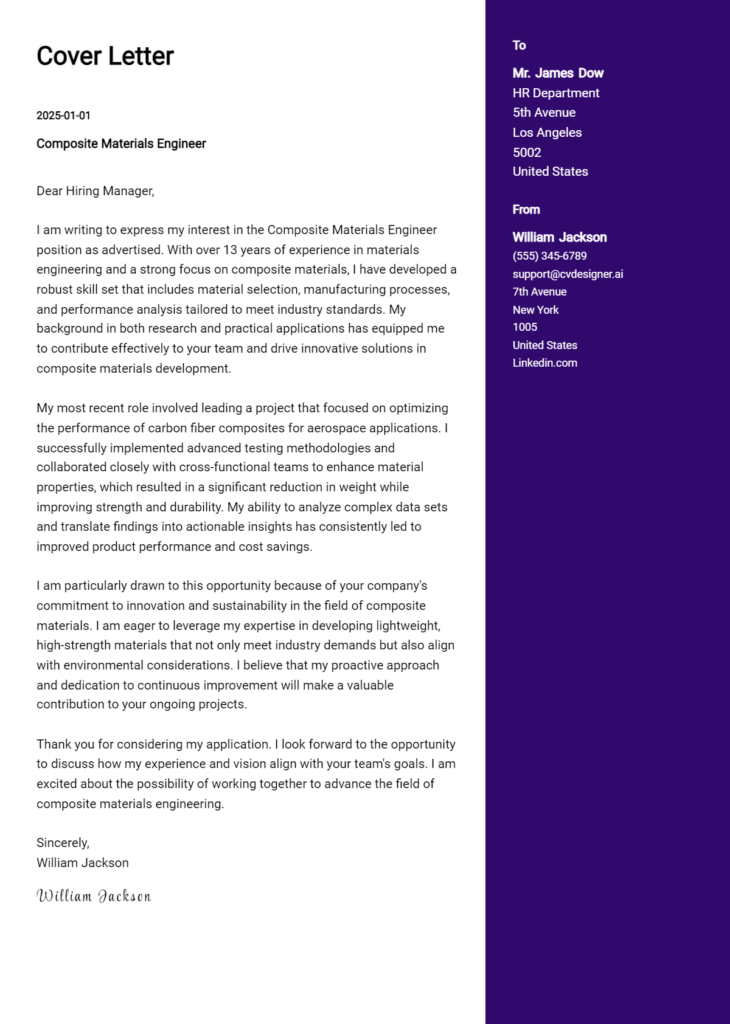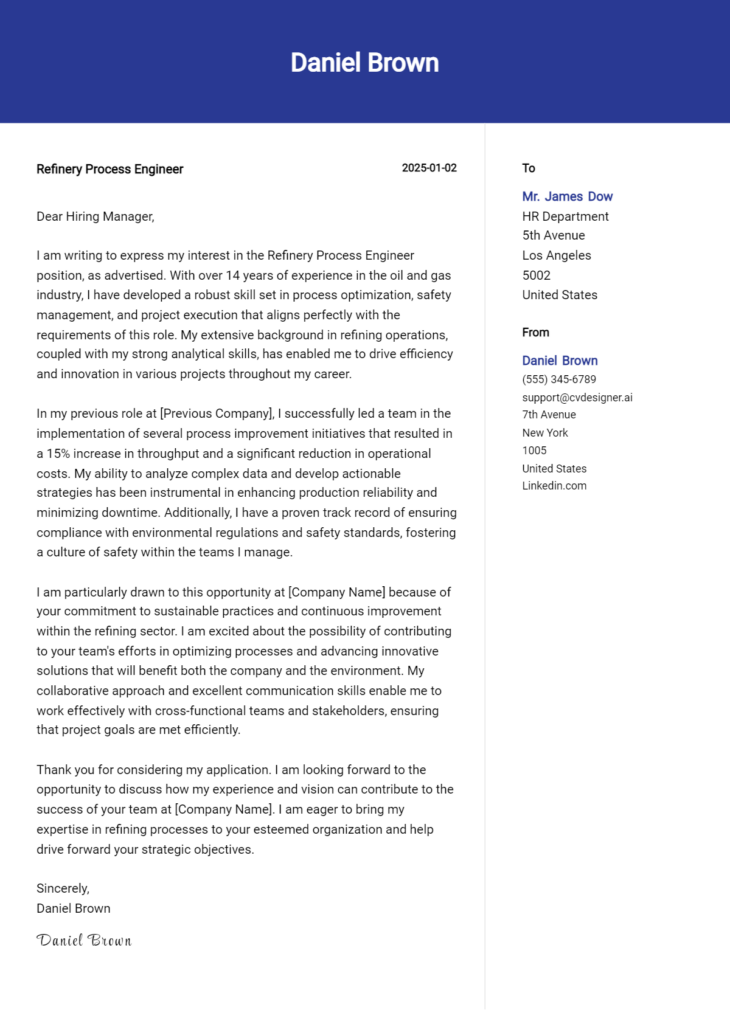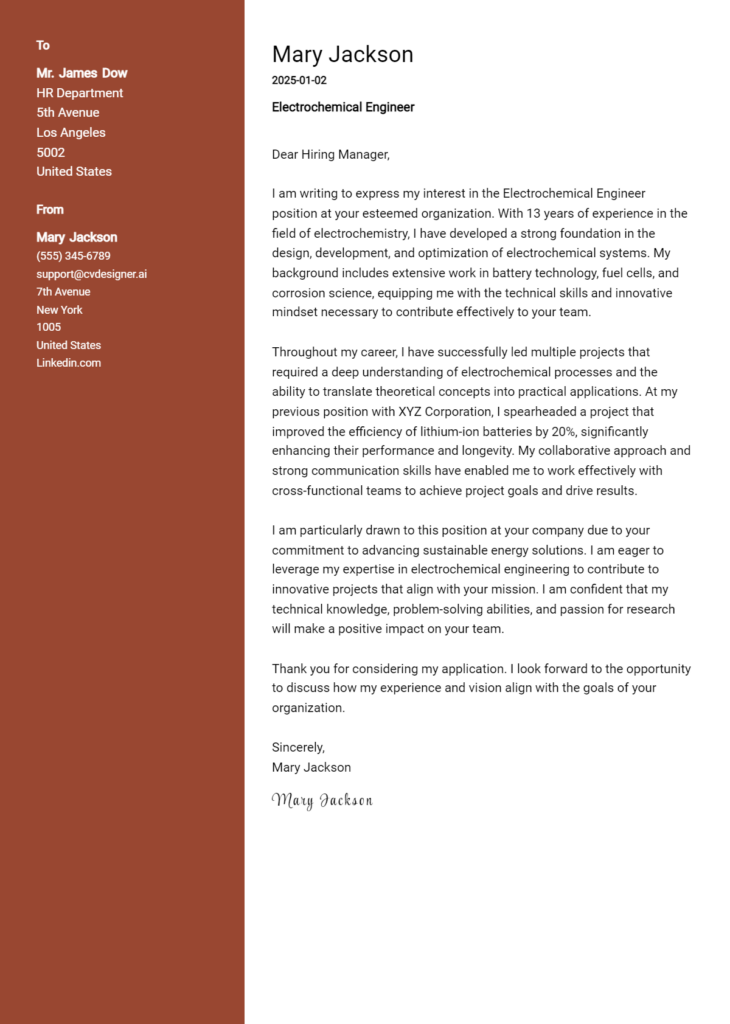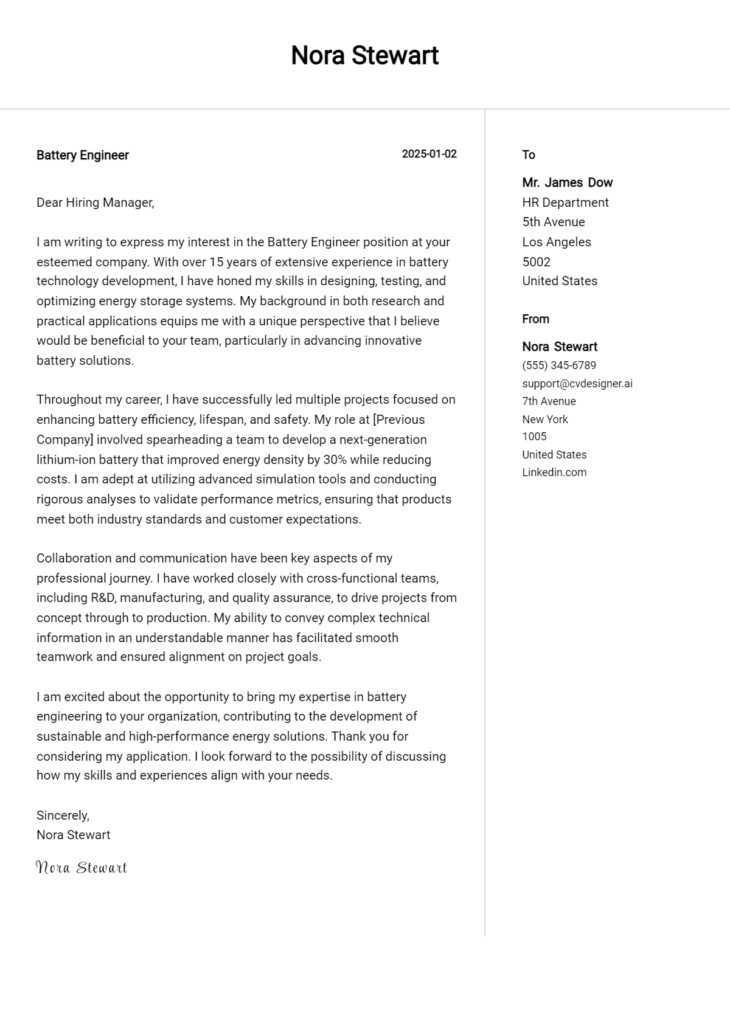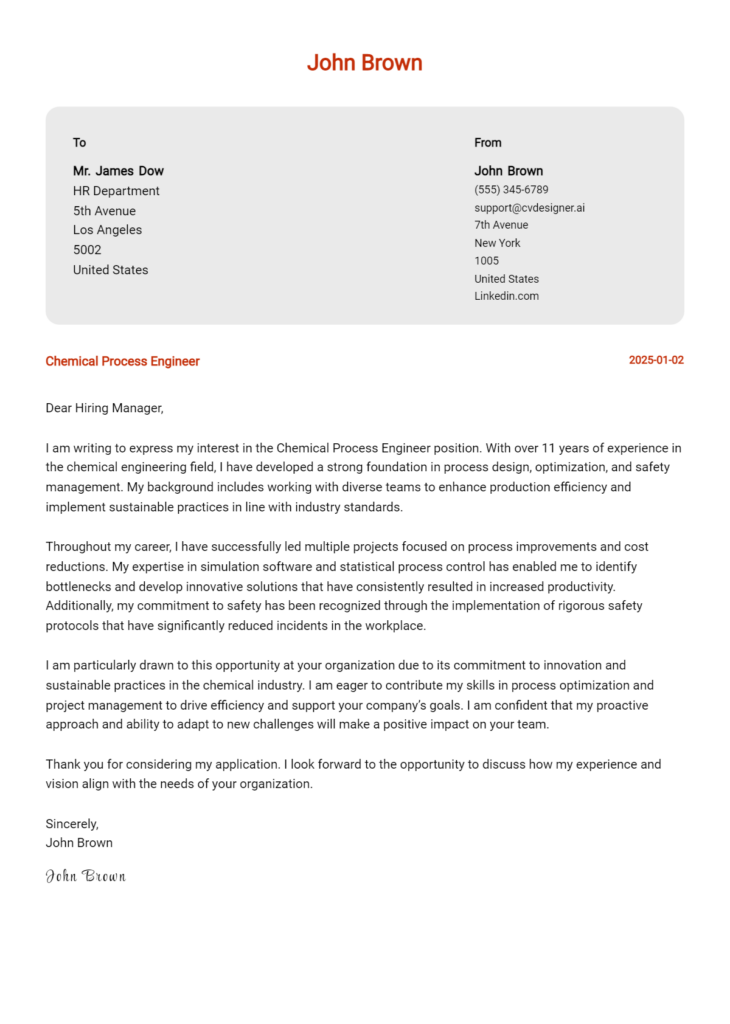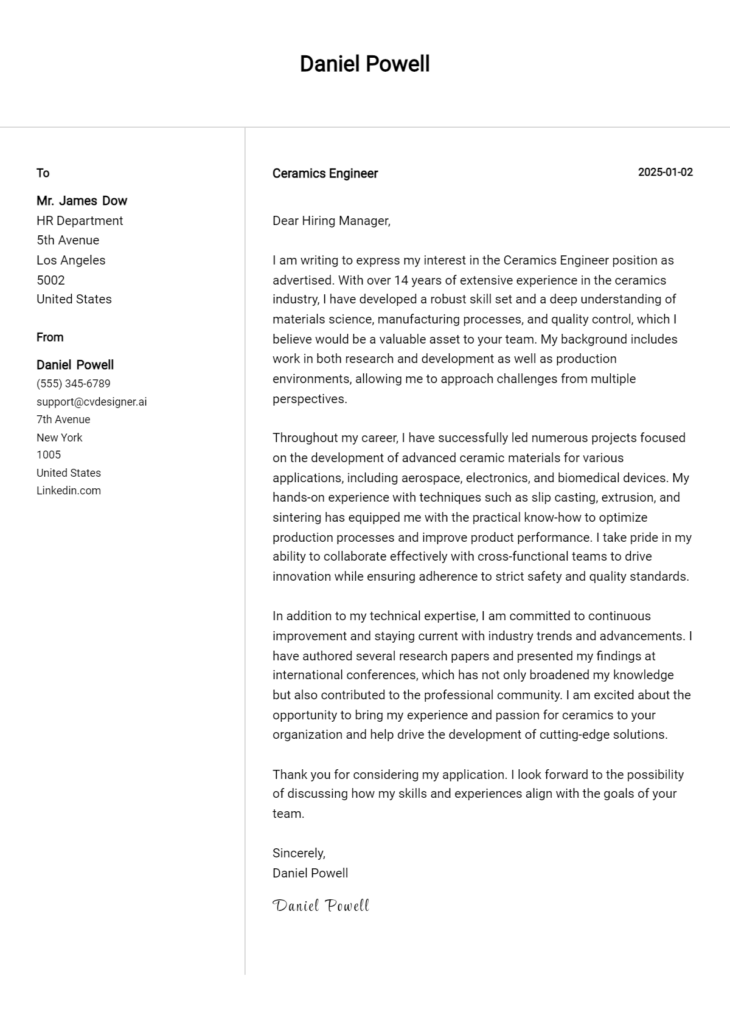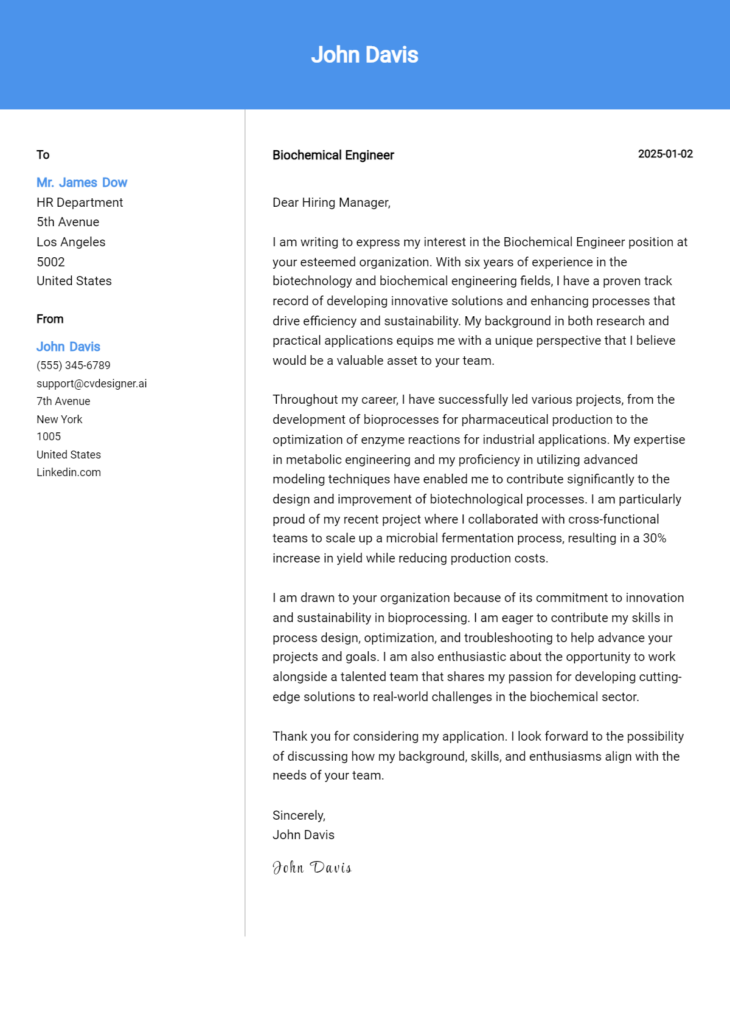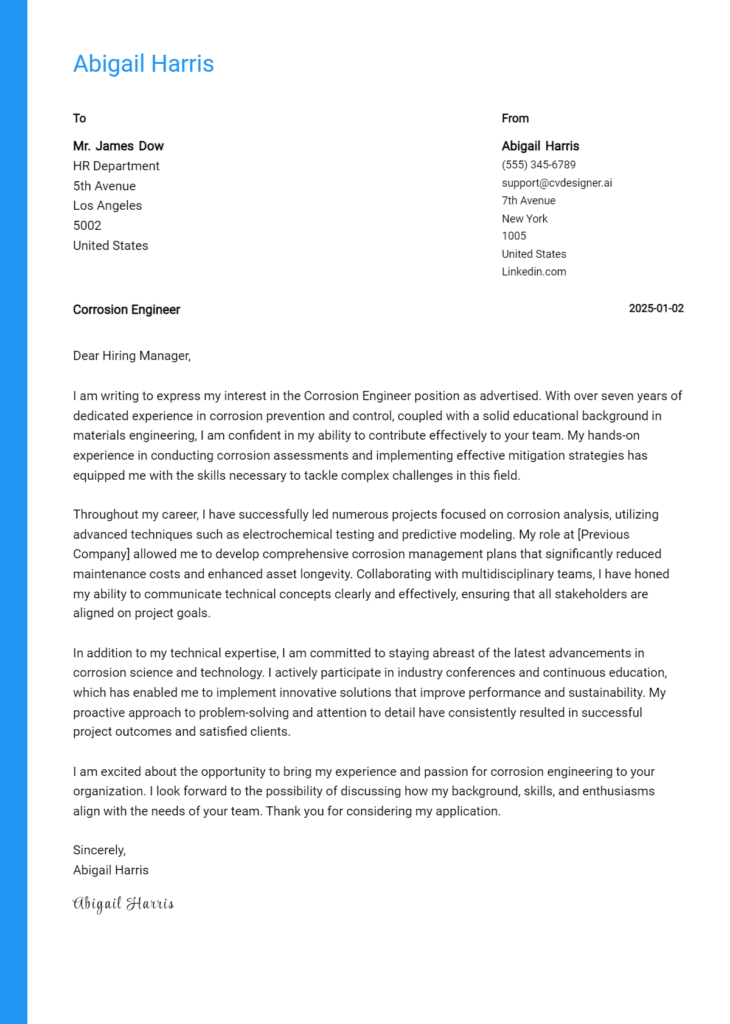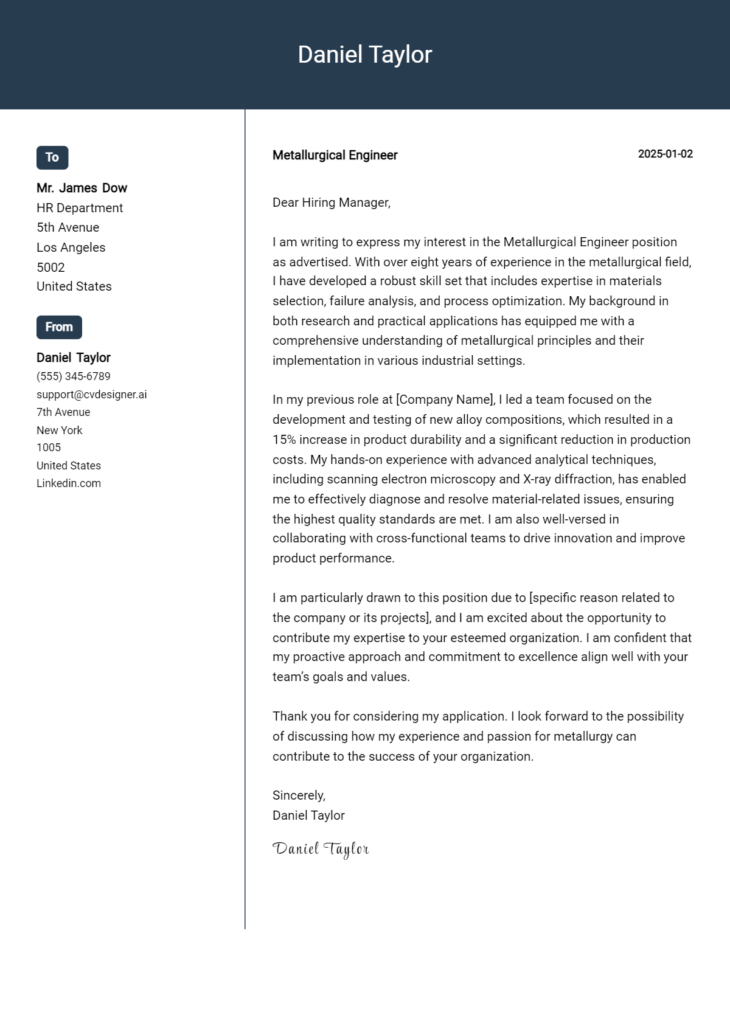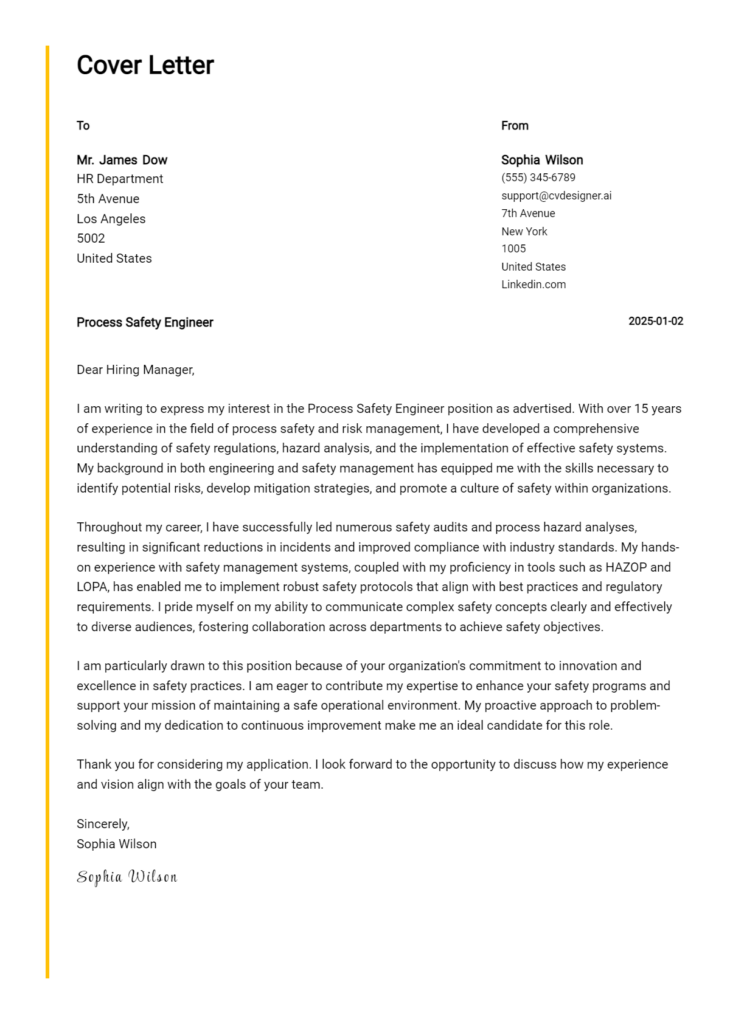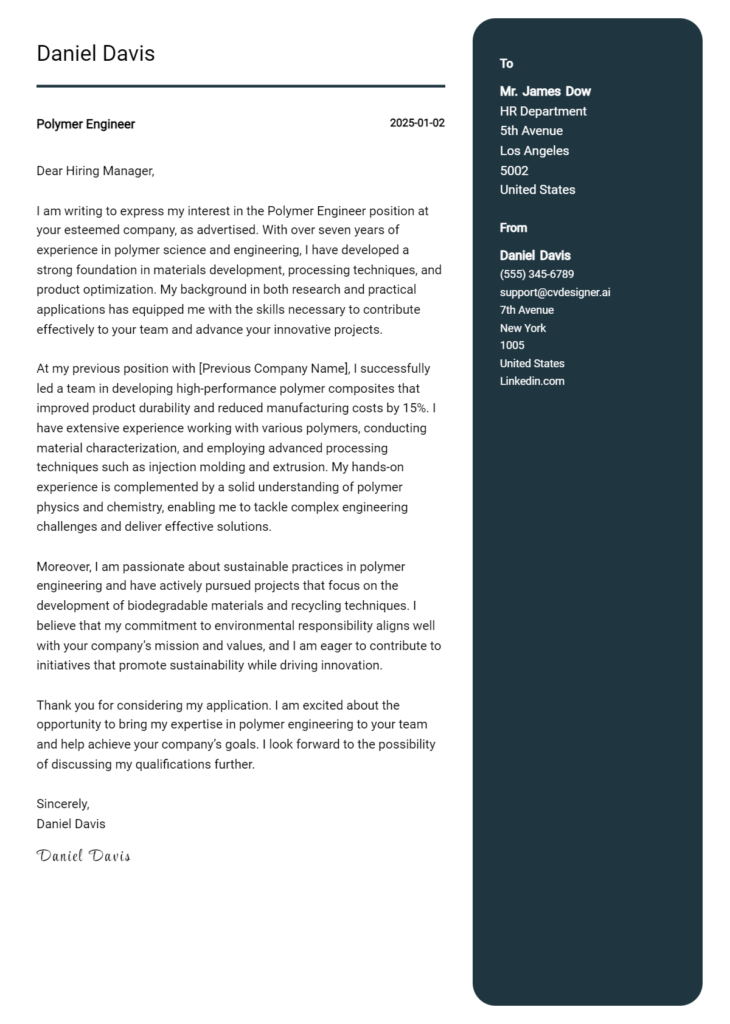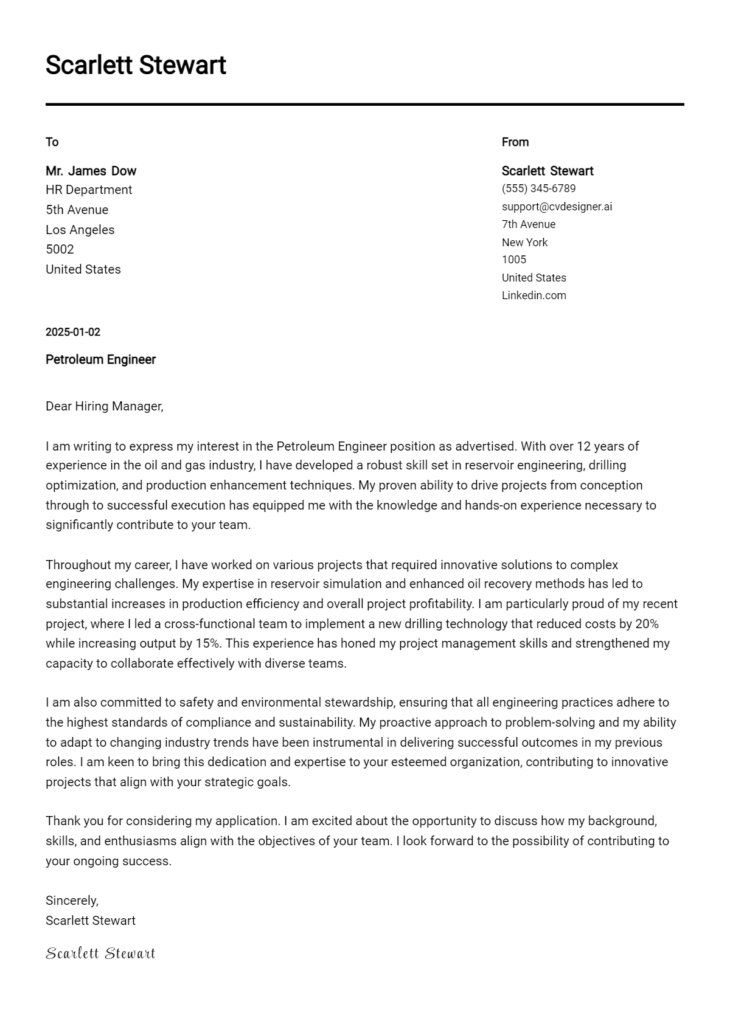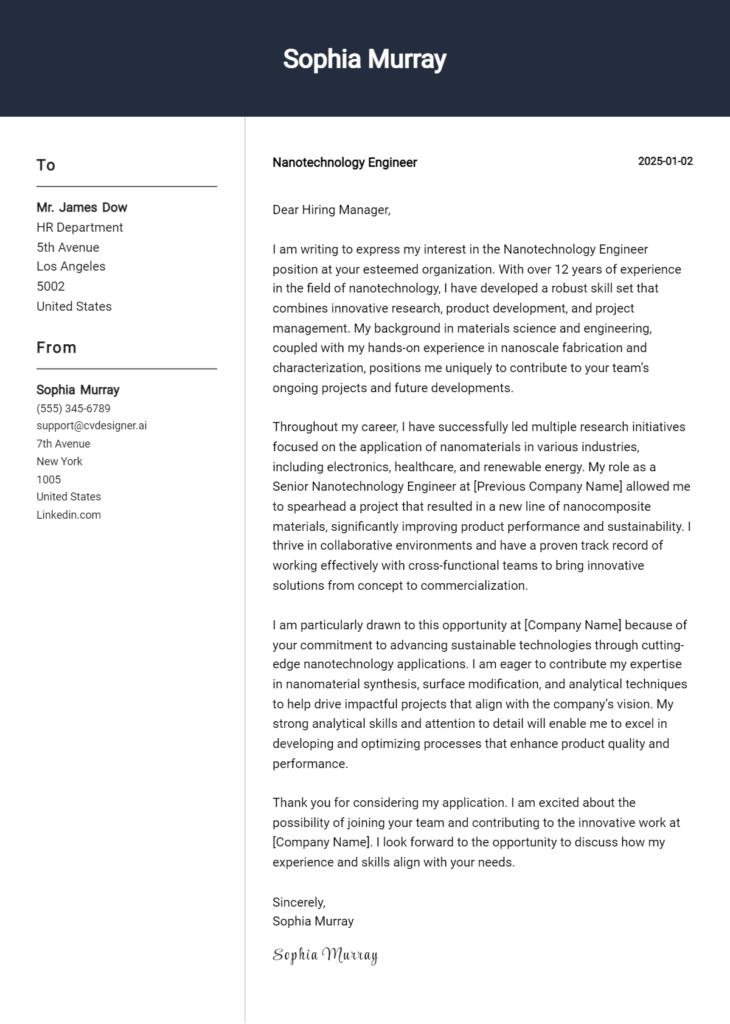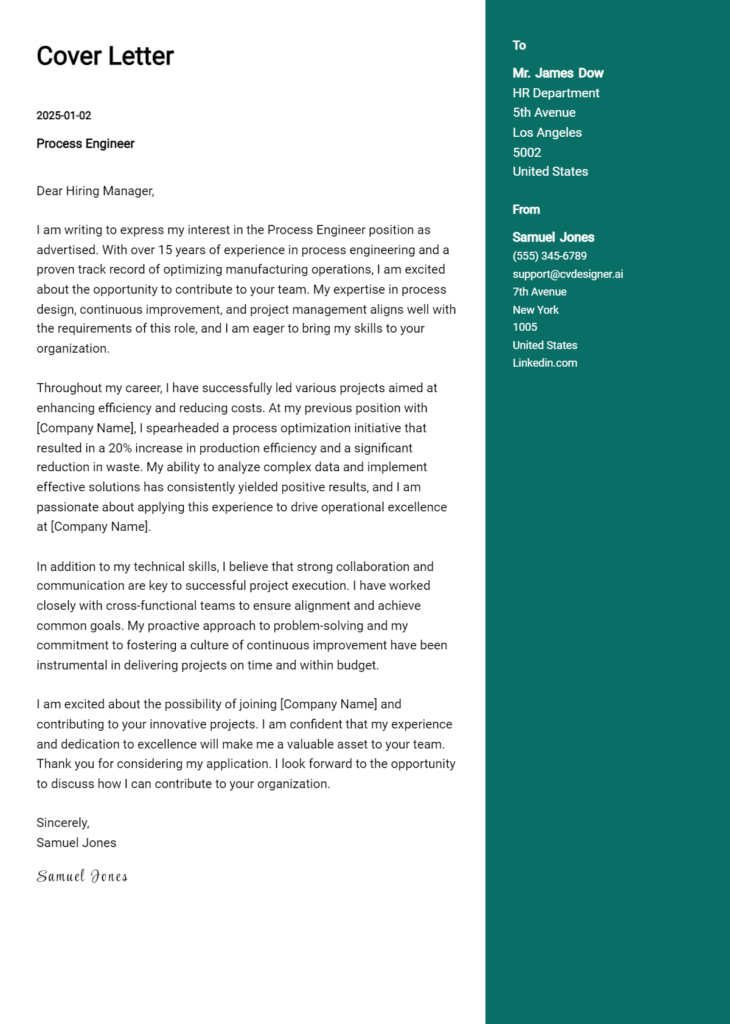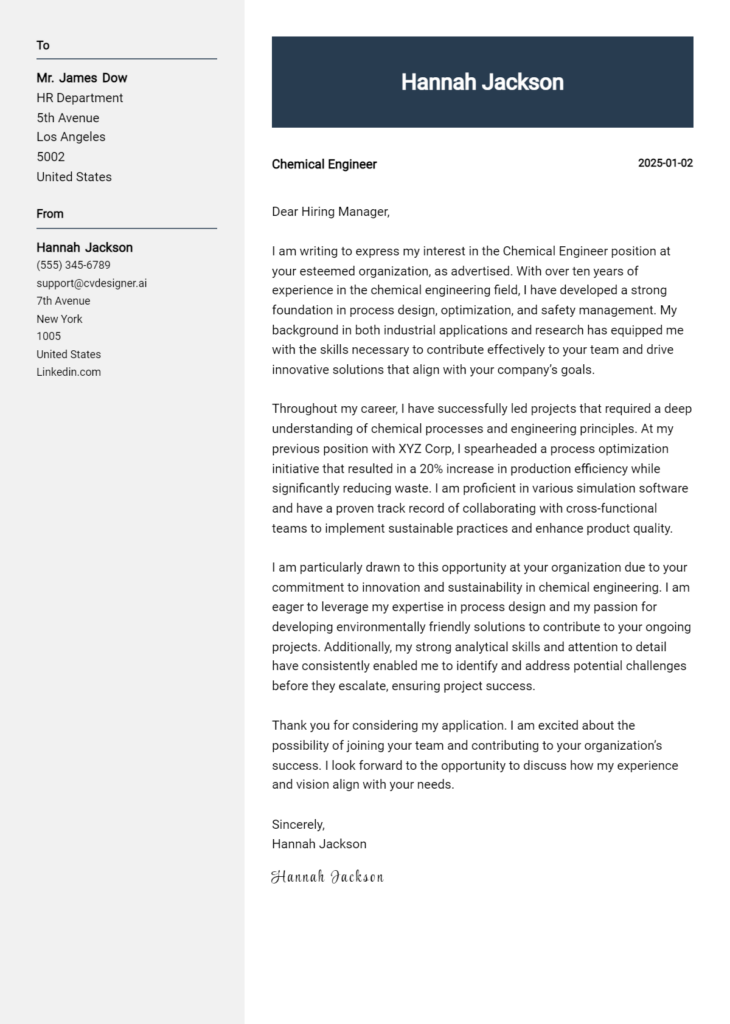Materials Engineer Cover Letter Examples
Explore additional Materials Engineer cover letter samples and guides and see what works for your level of experience or role.
How to Format a Materials Engineer Cover Letter?
Crafting a compelling cover letter is essential for a Materials Engineer, as it serves as your first opportunity to demonstrate both your technical expertise and your ability to communicate effectively. Proper formatting not only emphasizes your professionalism but also reflects your analytical skills and attention to detail—attributes that are vital in materials engineering. A well-structured cover letter can capture the hiring manager's attention and set you apart from other candidates by showcasing your unique qualifications and experiences.
In this guide, we'll explore how to effectively structure your cover letter, providing insights and examples tailored specifically for Materials Engineers.
We will focus on the essential components of a professional cover letter, including:
- Cover Letter Header
- Cover Letter Greeting
- Cover Letter Introduction
- Cover Letter Body
- Cover Letter Closing
Each section plays a critical role in accentuating your engineering qualifications and showcasing your professionalism. Let’s dive into each component and discover how to make your materials engineer cover letter shine.
Importance of the Cover Letter Header for a Materials Engineer
The cover letter header is a crucial component of any professional correspondence, including that of a Materials Engineer. It serves as the first impression and provides essential information, ensuring clarity and professionalism. A well-organized header should include your contact information, the date, and the recipient's details, allowing the reader to easily identify you and your intent. This not only reflects your attention to detail but also sets the tone for the remainder of your application. A strong header can enhance your credibility, while a weak one may lead to confusion or a negative impression.
Strong Example
John Doe 123 Engineering Lane Metropolis, NY 12345 john.doe@email.com (123) 456-7890 October 1, 2023 Ms. Jane Smith Hiring Manager Materials Solutions Inc. 456 Industry Blvd Metropolis, NY 12345
Weak Example
John D. 10/1/23 Jane S.
Importance of the Cover Letter Greeting for a Materials Engineer
The cover letter greeting plays a crucial role in setting the tone for the rest of the letter, as it is the first point of contact with the hiring manager. A well-crafted greeting demonstrates professionalism and shows that you have taken the time to personalize your application, which can help you stand out among other candidates. By addressing the hiring manager directly, you convey respect and genuine interest in the position. To make a lasting impression, avoid generic greetings like "To Whom It May Concern" or "Dear Hiring Manager." Instead, take the initiative to research and find the recipient's name, which can often be located on the company’s website or LinkedIn profile.
Strong Greeting Example
Dear Dr. Smith,
Weak Greeting Example
To Whom It May Concern,
By employing a thoughtful greeting, you not only enhance your cover letter but also create a positive first impression that encourages the hiring manager to read further.
The Importance of a Strong Cover Letter Introduction for a Materials Engineer
A well-crafted cover letter introduction is crucial for a Materials Engineer as it sets the tone for the entire application. This initial paragraph serves as the candidate's first opportunity to capture the hiring manager's attention, convey genuine interest in the role, and provide a snapshot of relevant skills or achievements. An engaging introduction can differentiate a candidate from others, making it essential to articulate enthusiasm and competence effectively. Below are examples of strong and weak introductions to illustrate the impact of a compelling opening.
Strong Example
Dear [Hiring Manager's Name], As a dedicated Materials Engineer with over five years of experience in developing innovative materials solutions for the aerospace industry, I am excited to apply for the Materials Engineer position at [Company Name]. My extensive background in polymer composite research, combined with my proven track record of optimizing material properties for enhanced performance, positions me uniquely to contribute to your team. I am particularly drawn to [Company Name]’s commitment to sustainability and innovation, and I am eager to bring my expertise in advanced materials to support your goals.
Weak Example
Hello, I am writing to apply for the Materials Engineer job. I have some experience in materials and think I could do well in this role. I have worked in a lab and have done some projects, but I am not sure how my skills fit with what you need. I hope you consider my application.
Purpose of the Cover Letter Body for a Materials Engineer
The cover letter body for a Materials Engineer serves as a critical platform to highlight the candidate's technical skills, relevant experiences, and the unique value they can bring to the organization. It allows the candidate to elaborate on specific projects or accomplishments that demonstrate their expertise in materials selection, processing, and testing, as well as their ability to solve complex engineering problems. By effectively articulating their background and achievements, the candidate can create a compelling narrative that aligns their qualifications with the needs and goals of the company, ultimately making a strong case for their candidacy.
Strong Example
Dear Hiring Manager, I am excited to apply for the Materials Engineer position at XYZ Corporation. With a Master's degree in Materials Science and over five years of experience in the aerospace industry, I have successfully led projects that focus on the development of lightweight composite materials. One of my notable achievements was spearheading a project that optimized the material properties of a new carbon-fiber composite, resulting in a 20% weight reduction and a significant cost savings of $500,000 for the company. My hands-on experience with material characterization techniques, coupled with my ability to collaborate across multidisciplinary teams, positions me well to contribute to innovative solutions at XYZ Corporation. Sincerely, John Doe
Weak Example
Dear Hiring Manager, I am interested in the Materials Engineer position. I have studied materials and have some experience in the field. In my previous job, I worked on various projects, but I don’t remember the specifics. I think I would be a good fit for your team. I am looking forward to the opportunity. Best, Jane Smith
Importance of the Cover Letter Closing for a Materials Engineer
The closing paragraph of a cover letter is crucial as it serves as the final opportunity to summarize your qualifications, reiterate your enthusiasm for the position, and encourage the employer to take the next steps—whether that’s reviewing your resume or scheduling an interview. A strong closing leaves a lasting impression and highlights your motivation and fit for the role, while a weak closing can diminish the impact of your application. Below are examples of both strong and weak closing paragraphs for a Materials Engineer position.
Strong Example
Thank you for considering my application for the Materials Engineer position at [Company Name]. With a solid foundation in materials science and extensive experience in developing innovative solutions, I am excited about the opportunity to contribute to your team. I believe my background aligns well with the requirements of the role, and I am eager to bring my skills in material selection and testing to [Company Name]. I look forward to the possibility of discussing my application further and am available for an interview at your earliest convenience. Please feel free to contact me to schedule a meeting. Thank you once again for your time and consideration.
Weak Example
I hope you like my resume. I think I could do okay as a Materials Engineer at [Company Name]. If you want to talk, you can call me. Thanks for reading my letter.
Crafting an effective cover letter is crucial for candidates applying for a Materials Engineer position. A well-written cover letter not only highlights your technical skills and abilities but also showcases your problem-solving capabilities and understanding of the software development life cycle (SDLC). Moreover, it should reflect your ability to work in teams and your passion for continuous learning in this ever-evolving field. The following tips will guide you in creating a compelling cover letter that stands out.
Cover Letter Writing Tips for Materials Engineer
Highlight Technical Skills: Start by clearly articulating your technical skills relevant to materials engineering, such as materials selection, failure analysis, and materials testing. Use specific examples from your past experiences to demonstrate your expertise. This will not only show your qualifications but also illustrate your ability to apply these skills in practical scenarios.
Emphasize Problem-Solving Abilities: Materials engineers often face complex challenges that require innovative solutions. When writing your cover letter, include instances where you successfully identified a problem and implemented a solution. This could involve improving a manufacturing process, enhancing material properties, or troubleshooting material failures. Showcasing your analytical thinking will set you apart from other candidates.
Demonstrate Knowledge of SDLC: If applicable, mention your familiarity with the software development life cycle, particularly if you have experience in simulations or modeling software used in materials engineering. Discuss how your knowledge of SDLC can contribute to project efficiency and product quality, making you a valuable asset to the team.
Showcase Teamwork and Collaboration: Materials engineering often requires collaboration with cross-functional teams. Highlight your experience working in teams, showcasing your communication and interpersonal skills. Provide specific examples of successful projects where teamwork was essential to achieving goals, illustrating your ability to work effectively with others.
Express Passion for Continuous Learning: The field of materials engineering is constantly evolving, so it’s important to convey your commitment to continuous learning. Mention any relevant certifications, workshops, or courses you have pursued to stay updated with industry trends and advancements. This not only shows your dedication to professional growth but also your enthusiasm for the field.
By incorporating these tips into your cover letter, you can effectively showcase your skills and experiences as a Materials Engineer. For additional guidance, consider exploring cover letter templates or using a cover letter builder to streamline the writing process.
Common Mistakes to Avoid in a Materials Engineer Cover Letter
Crafting a compelling cover letter is essential for any aspiring Materials Engineer, as it serves as your first impression to potential employers. Avoiding common mistakes can significantly enhance your chances of securing an interview. Here are some pitfalls to watch out for:
Generic Greetings: Using "To Whom It May Concern" can make you seem disinterested. Research the hiring manager's name and personalize your greeting.
Lack of Specificity: Failing to tailor your cover letter to the specific job can signal a lack of enthusiasm. Make sure to highlight relevant skills and experiences that align with the job description.
Excessive Length: A cover letter should be concise—ideally one page. Long-winded letters can lose the reader's interest. Stick to the essential points.
Ignoring Formatting Guidelines: A cluttered or poorly formatted cover letter can detract from your message. Refer to this cover letter format to ensure your document looks professional.
Neglecting Proofreading: Spelling and grammatical errors can undermine your professionalism. Always proofread your letter or have someone else review it before submission.
Focusing on Duties Instead of Achievements: Simply listing job responsibilities can be uninspiring. Instead, focus on your accomplishments and how they relate to the role you're applying for.
Failing to Include a Call to Action: Leaving out a closing statement that encourages a follow-up can miss an opportunity to engage the hiring manager. Express your eagerness to discuss your application further.
For additional guidance, check out these cover letter examples that can inspire your own writing. By steering clear of these common mistakes, you can create a strong and effective cover letter that showcases your qualifications as a Materials Engineer.
Cover Letter FAQs for Materials Engineer
What should I include in my cover letter as a Materials Engineer?
In your cover letter, you should highlight your relevant education, skills, and experience specific to materials engineering. Start with a strong opening that conveys your enthusiasm for the position. Include details about your academic background, such as your degree in materials science or engineering, and any relevant certifications. Discuss your hands-on experience with materials testing and characterization, as well as any projects where you have developed or improved materials. Make sure to tailor your cover letter to the job description by incorporating key terms and skills mentioned in the posting. Finally, express your passion for the field and how your unique contributions can benefit the company.
How can I demonstrate my technical skills in my cover letter?
To effectively demonstrate your technical skills as a Materials Engineer, use specific examples that illustrate your expertise. Mention any specialized software or tools you are proficient in, such as finite element analysis (FEA) or materials simulation software. Discuss your experience with laboratory techniques, such as tensile testing, metallography, or scanning electron microscopy (SEM). Additionally, if you have worked on interdisciplinary teams or contributed to research projects, describe your role and the outcomes achieved. Providing quantitative results, such as improvements in material performance or cost reductions, will further solidify your technical capabilities. Always align your skills with the requirements of the job you are applying for.
How can I make my cover letter stand out?
To make your cover letter stand out, focus on telling a compelling story that connects your personal journey to your professional aspirations. Highlight unique experiences that shaped your interest in materials engineering, such as internships, research projects, or challenges you overcame. Use a confident and enthusiastic tone while ensuring your writing is clear and concise. Customizing your cover letter for each application is essential; reference specific projects or values of the company that resonate with you. Including a strong closing statement that invites further discussion about your application can also leave a lasting impression. Remember, showcasing your personality and passion can set you apart from other candidates.
How long should my cover letter be?
Your cover letter should ideally be one page long, comprising three to four paragraphs. Aim for a concise format that allows you to communicate your qualifications effectively without overwhelming the reader. Each paragraph should serve a specific purpose: an engaging introduction, a body section detailing your relevant experience and skills, and a conclusion that reiterates your enthusiasm for the role. Keeping your cover letter to a single page is important, as hiring managers often have limited time to review applications. Ensure that your formatting is professional, using clear headings and bullet points if necessary to enhance readability while still adhering to the one-page guideline.
Build your Cover Letter in minutes
Use an AI-powered cover letter builder and have your letter done in 5 minutes. Just select your template and our software will guide you through the process.

